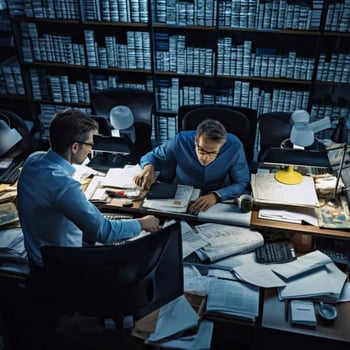Discovery is a process in the criminal justice system that’s vital for ensuring fair cases. The primary goal of discovery is to prevent surprise and establish fairness by enabling both sides to access the same evidence and evaluate the strength of their cases. Specific rules and regulations that vary by jurisdiction govern this process.
What is the Purpose of Discovery?
Without discovery, cases would be much less transparent for both sides. There would be a lot of surprises from terrible witnesses and incorrect experts. Justice would not be served.
The purpose of discovery in criminal law is multifaceted. It lets the prosecution and the defense act on equal footing before presenting their cases at trial. This makes criminal cases more fair. A person’s freedom hangs in the balance in a criminal proceeding, so courts must do their duty with no hint of unfairness.
By allowing parties to access the same evidence, discovery aims to prevent surprise and enable effective cross-examination during trial. Discovery helps filter out weak or unreliable evidence early in the trial process. It encourages parties to consider the strength of their cases and can lead to plea negotiations or the early resolution of a case, saving valuable time and resources.
Ultimately, discovery aids in preventing wrongful convictions and promoting justice. By allowing both sides to uncover and present all relevant evidence, it reduces the risk of wrongful convictions based on incomplete or biased information.
Discovery serves as a critical mechanism for fairness in criminal trials. If one side withholds evidence, then they cannot make an effective counter to the opposing side’s arguments. It would even create situations where one side could use its hidden evidence to entrap the other side in a poor argument.
The Exchange of Information Through Discovery
 This comprehensive exchange of information through discovery helps to avoid any unwarranted surprises during trials and allows for a more informed decision-making process.
This comprehensive exchange of information through discovery helps to avoid any unwarranted surprises during trials and allows for a more informed decision-making process.
If discovery reveals a bulletproof case of guilt or innocence on its own, both sides can come to an agreement that doesn’t involve the courtroom. This exchange of information also helps to narrow down the issues in dispute and potentially lead to a more efficient resolution of the case. As long as the trial hasn’t started yet, either side can change their approach based on what’s found during discovery.
There are many forms of evidence exchanged during discovery. Here are a few of the common types you’ll see in criminal cases.
Document Discovery
Document discovery is the exchange of any document, physical or electronic, relevant to the case. A lot of time goes into sorting through documents to see what is relevant before trial. Some examples of common documents in criminal trials include police reports and witness statements. By sharing documents, both the defense and prosecution can thoroughly analyze the strengths and weaknesses of their respective positions.
Witness Discovery
Witness statements are another element of discovery. The discovery process lets both sides evaluate the testimony and the credibility of any witnesses. They may find inconsistencies or contradictions that could harm either side, or it could reveal that a witness isn’t reliable or has too much bias to be of value for a case.
This process helps both the prosecution and the defense to determine which witnesses will be called to testify in court and to prepare for the cross-examination of opposing witnesses. Witness statements collected during discovery can inform witness strategies during trial to counter opposing arguments.
Expert Discovery
In complex criminal cases, expert witnesses may be called upon to provide specialized knowledge or analysis. By exchanging expert reports, both the defense and prosecution can evaluate the qualifications and findings of these experts similarly to witness discovery. This helps to ensure that any expert testimony presented at trial is reliable and admissible.
Expert discovery is important in cases that involve complex scientific or technical issues. Attorneys can identify and consult with experts in various fields to gain a better understanding of the evidence and to strengthen their arguments.
Interrogatories
Interrogatories involve written questions that one party poses to the other about the case. They are a valuable tool for attorneys to gather specific information from the opposing party. Through written questions, attorneys can seek clarification on certain aspects of the case, request details about the opposing party's claims or defenses, and gather additional evidence.
Interrogatories provide a structured and formal way to obtain information, allowing attorneys to build a comprehensive understanding of the case and to prepare their arguments accordingly. They’re often informed by evidence gathered from document discovery, witness discovery, and expert discovery.
Depositions
Depositions involve sworn testimony given outside of the courtroom, typically conducted by attorneys and recorded by court reporters. Attorneys have the opportunity to ask questions and receive immediate responses from the deponents, ensuring a thorough examination of the facts.
Depositions are typically conducted in a less formal setting than the courtroom, allowing for a more relaxed and conversational atmosphere. The testimony obtained during depositions can be used to challenge the credibility of witnesses or to gather additional evidence that may strengthen the case.
The Discovery Process
 The discovery process typically begins shortly after charges are filed and continues until the trial begins. Each jurisdiction has its specific rules and timeframes for discovery, but certain common steps can be expected.
The discovery process typically begins shortly after charges are filed and continues until the trial begins. Each jurisdiction has its specific rules and timeframes for discovery, but certain common steps can be expected.
First, the defense requests and receives the prosecution's evidence, which may include police reports, witness statements, and forensic test results. The prosecution, in turn, requests evidence from the defense. The parties must comply with the disclosure requirements set by the jurisdiction's laws.
This first phase is called initial discovery. Once the initial exchange of evidence and information occurs, the parties may engage in additional discovery processes, such as depositions and expert witness interviews. These procedures allow for a more comprehensive understanding of the case and may uncover additional evidence or perspectives. The later phases are called pre-trial discovery.
The discovery process culminates in the final preparation for trial. Each side takes what it has learned during discovery and creates a case to present during trial to the jury, along with any pre-trial motions.
The process may also reveal that one side or the other is too weak to stand up to a criminal trial. This could lead to plea deals, if the defendant’s case is weak, or charges getting dropped if the prosecution is weak.
Types of Evidence in Discovery
 During the discovery process, various types of evidence may be shared between the prosecution and the defense. These include:
During the discovery process, various types of evidence may be shared between the prosecution and the defense. These include:
- Physical Evidence: Physical evidence consists of tangible objects such as weapons, clothing, or documents that apply to the case.
- Witness Testimony: Statements made by witnesses or individuals involved in the case, whether they be firsthand observations or expert opinions.
- Expert Reports: Reports prepared by qualified experts, such as forensic scientists or medical professionals, offering their analysis and opinions on the evidence.
- Audiovisual Evidence: This encompasses recordings, such as surveillance footage or audio recordings, that may provide crucial information about the events in question.
- Electronic Evidence: Social media posts, emails, and other electronic documents are even more common than physical records these days.
What Evidence Is A Defendant Entitled to Receive?
In a criminal case, defendants have certain rights including discovery rights. One of these is the duty to disclose. A criminal defense lawyer will use these rights to get information from the prosecution that’s necessary to mount a fair defense for their client. Some of this evidence includes:
- Case files
- Tests and examinations made by the defendant (e.g. a blood test for a DUI proceeding)
- Oral statements
- Evidence gathered on behalf of law enforcement agency or prosecution’s office
- Expert witnesses and their testimony
- Contents of intercepted communications
- A list of witnesses before jury selection
Prosecutors have an ethical duty to disclose evidence to the defense team even if it’s damaging to their case. However, state and federal rules have many guidelines about what can and cannot be disclosed during discovery in criminal law.
Lawyers and prosecutors must be intimately familiar with what is discovery in criminal law to avoid punishment. If one side or the other hides evidence that should have been revealed during discovery, the court can sanction them for non-compliance with the rules. In extreme situations, the case could even get declared a mistrial and court participants sanctioned for failing to follow procedure.
How is eDiscovery Software Changing the Discovery Process?
In recent years, the widespread use of technology in the legal field has significantly impacted the discovery process. One significant change is the emergence of eDiscovery software, which refers to technologies designed to manage and analyze large volumes of electronic data. In fact, data has become such an important part of the process that we could call the discovery process the eDiscovery process.
eDiscovery software enables the efficient organization, storage, and retrieval of electronic evidence, including emails, social media posts, and digital documents. It streamlines the discovery process by providing advanced search and analytical tools that speed up the identification and review of relevant electronic data.
eDiscovery software has become a valuable tool in complex criminal cases. It allows legal teams to sift through vast amounts of digital evidence more effectively, reducing time and resource investment. Additionally, it enhances collaboration among legal professionals, facilitating the sharing and analysis of digital evidence from various sources.
However, the use of technology in discovery in criminal cases also poses new challenges. Legal professionals must navigate privacy concerns, data protection laws, and learn to understand and interpret metadata associated with electronic evidence. To learn about how our software can help your firm with discovery challenges, schedule a demo with us.
Conclusion
Discovery in criminal cases plays a vital role in the criminal justice system by ensuring fairness, promoting the thorough examination of evidence, and facilitating the resolution of cases. Through various types of discovery, parties can gather information, assess the strength of their cases, and make informed decisions about their legal strategies.
With eDiscovery software, the discovery process has become more efficient and manageable, despite the increasing volumes of electronic evidence. Software like ours has become an essential tool in a world where so much evidence is now stored electronically. Defense attorneys who want to keep the prosecution honest must learn how to use these tools effectively to uphold the principles of justice and fairness.
-1.png?width=400&height=164&name=DWRLogoClassic%20-%20Copy%20(2)-1.png)









Comment On This Article